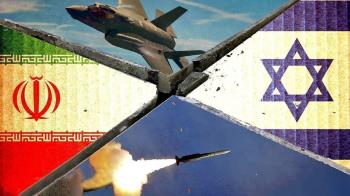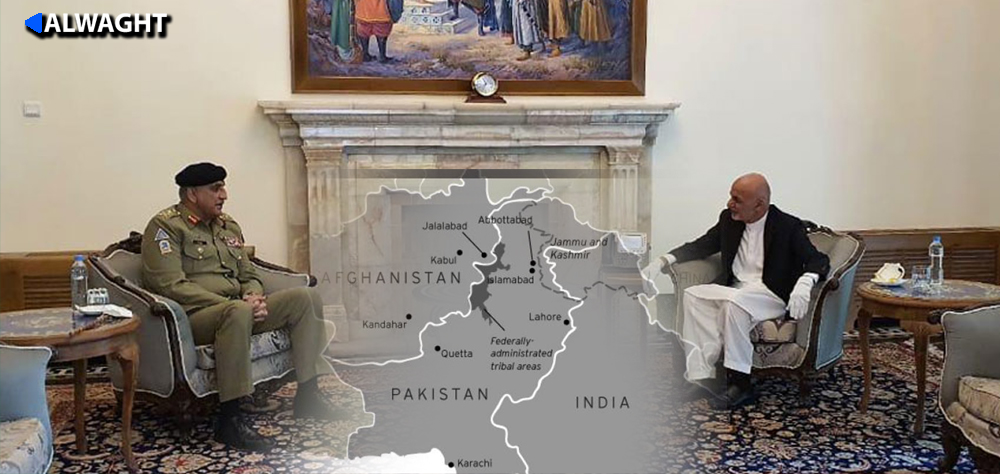Alwaght- Pakistan’s army chief General Qamar Javed Bajwa arrived on Tuesday in Afghanistan for an official visit. He met President Ashraf Ghani and Afghan High Peace Council chief Abdullah Abdullah. No details of the meetings have been published yet.
The two sides discussed the latest Afghanistan and regional developments, media outlets reported.
The visit of Pakistan's top military authority to neighboring Afghanistan is of high significance.
Pakistan role and interests in Afghanistan peace process
Pakistan is seeking a power-sharing agreement in Afghanistan. If the Taliban play a bigger role in the Afghan government, then the government will have more friendly relations with Islamabad, so it is crucial for Pakistan that the next Afghan government be formed with the participation of the rebel group.
Pakistan, on the other hand, has a unique position to use the two-stage structure of the peace process because of its relationship with the US and the Taliban. During the Qatar talks, Pakistan also helped bring the Taliban to the negotiating table, which eventually led to a deal. Pakistani Foreign Minister Shah Masoud Qureshi attended the signing of the US-Taliban peace agreement on February 29, 2020 in Doha and congratulated both sides.
At the same time, it should be noted that Pakistan is unlikely to want full Taliban control over Afghanistan. First, Pakistan's relations with the Taliban are not integrated. And second, Pakistan does not want an Islamic Emirate in Afghanistan like the one preceded the American invasion of Afghanistan in the early 2000s.
Pakistan's current approach to the peace process in Afghanistan is more about the Taliban's participation in the distribution of power than the monopoly of power in the hands of the militant group. Contrary to Islamabad’s pat backing to the group’s monopolization of the power, today, Islamabad leaders have come to the conclusion that because of the Taliban's growing power and influence in the tribal areas, its monopoly of power can pose a potential threat to territorial integrity and internal independence of Pakistan.
The mission of the senior general in Afghanistan
As it was said, for Pakistan, the Afghan peace is of paramount importance. Actually, Islamabad is resolved to see the Taliban securing a share in the power. Having in mind the Afghanistan peace is advancing under various initiatives, that of Doha or Istanbul, the Pakistani leaders are pushing to concluding in the Taliban being a party to the power.
In addition to the peace talks, one of Pakistan's constant concerns in its relations with Afghanistan is differences over the Durand Line that marks Pakistan's border with Afghanistan. This border line has always been a focus of meetings and talks between officials of the two countries. Though Pakistan does not have serious and immediate concerns about this border line at present, it is one of the countries with the potential for political instability due to its ethnic composition, unbalanced development, and unbalanced political participation that invite for pro-separation and divergence leanings in that country. Khybar Pashtunkhwa and Baluchistan are two deprived provinces and somehow discontented with the government performance. The Pakistani tribal areas bordering Afghanistan are a weakness in the central government’s control and supervision power. So, Durand Line remaining contentious can put at stake, beside other factors, the Pakistani national security and territorial integrity. It is favorable for Islamabad if Kabul recognizes the border line and quits its claims over territories beyond the line. It is this significance that puts the line constantly in the center of discussions when the two sides’ officials meet.
Another point that needs to be taken into consideration is that Afghanistan is the competition field of Pakistan and India. So, one of the demands of Pakistani leaders from Kabul leaders is to tailor their view on India in line with that of Islamabad. In Pakistan’s viewpoint, which has historical dispute with India, Afghanistan should not be a strategic regional partner for India. Its expectation is that Kabul take Islamabad as its strategic partner and meet Pakistan considerations in its foreign policy.
From another dimension, there are major worries about the Taliban participation in the power. The Hazaras, Tajiks, and other ethnic groups are seriously concerned that the Taliban joining the political process will result in power monopoly in the hands of the Pashtuns who have the Pakistani patronage. Perhaps visit to Afghanistan of a senior military official of Pakistan and meeting with the Peace Council whose leader are originally from the Hazaras is meant to assuage the concerns about the Taliban integration in the power.



























